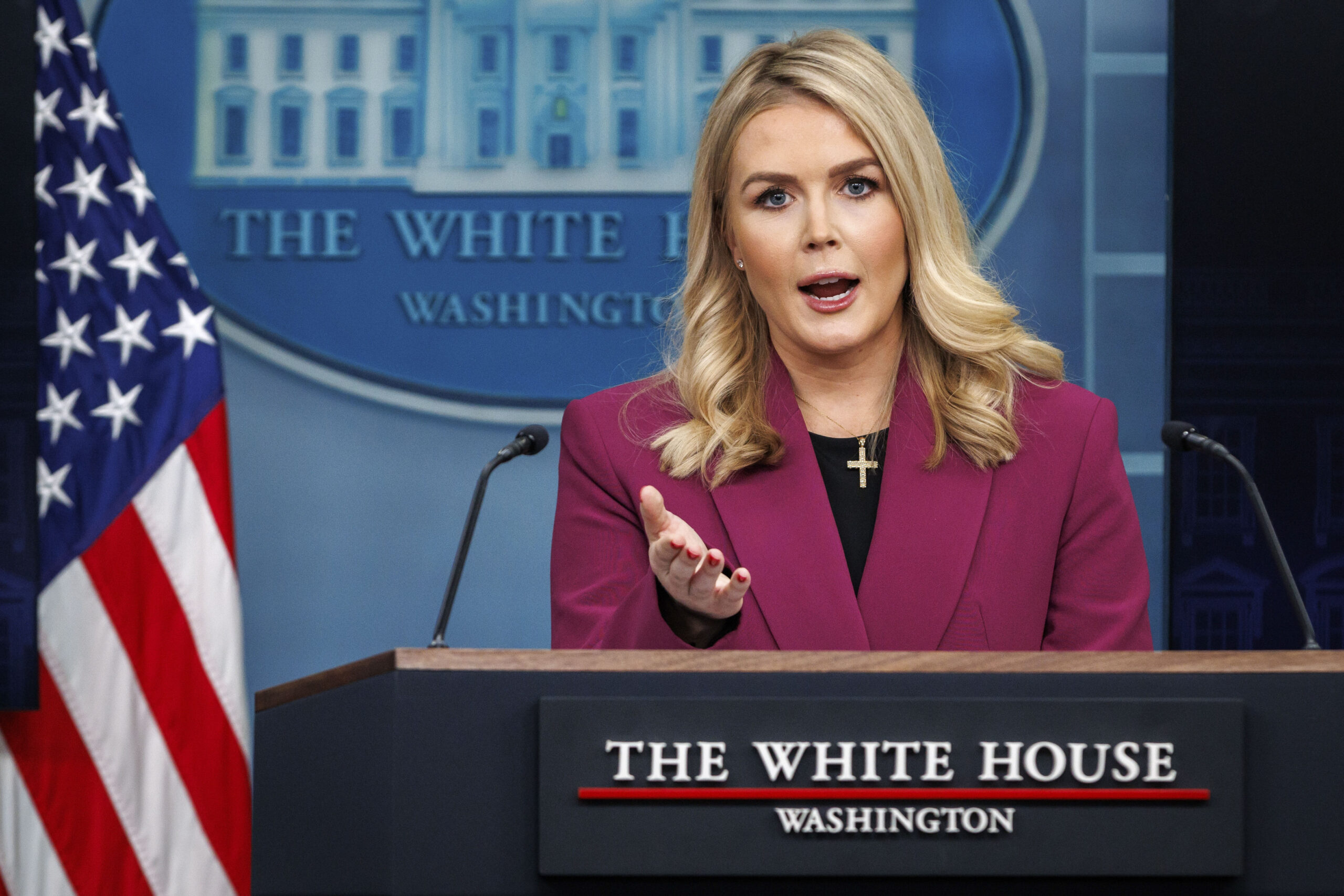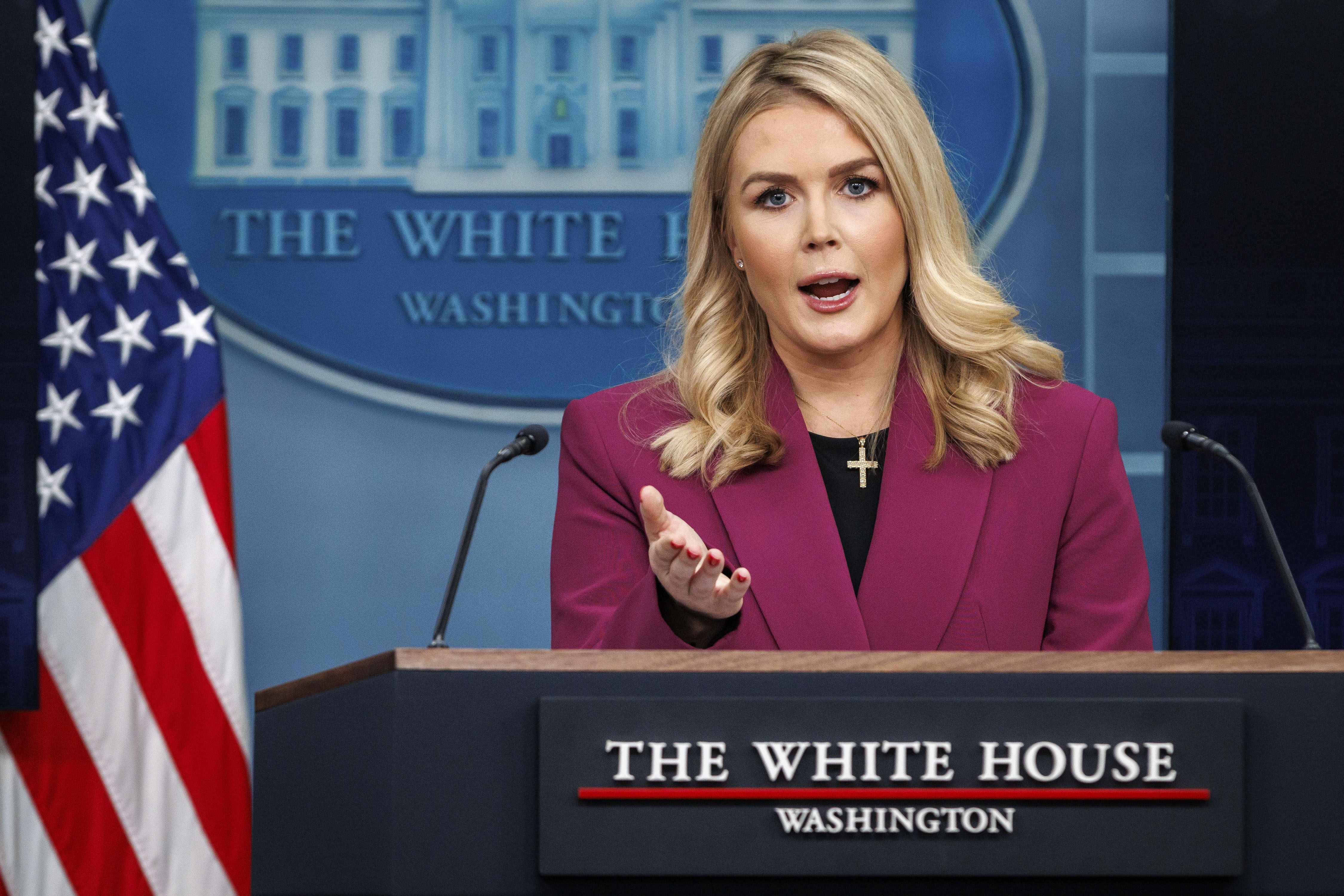Congress
Trump still wants a spending fight with Congress, even after memo debacle

The Trump administration has been spoiling for a legal fight over its power to ignore Congress’s spending laws since the president was last in office. But sending Washington into a tailspin over a poorly written memo was not part of the plan.
While the Trump administration intends to ax funding for initiatives it views as out of step with its priorities — like foreign aid, diversity, equity and inclusion efforts and environmental spending — it didn’t mean to blow up funding for a broader suite of programs as it did when the White House budget office on Monday released a memo that brought all federal financial assistance programs to a grinding halt, according to two senior administration officials, granted anonymity to speak about private conversations.
The memo appeared to be a brazen and sweeping attempt to challenge Congress’s power of the purse under a theory from Trump’s appointee for White House budget office director, Russell Vought, that the executive branch is not required to spend dollars that do not align with its goals.
And it was — the White House just didn’t intend for it to be quite so sweeping.
Trump’s inner circle was irked about the OMB memo, complaining Wednesday that it had not gone through the proper channels and wasn’t vetted. Its broad wording created a political and a legal problem — arousing anger and concern even from some Republican lawmakers worried their constituents would be hurt and putting the administration in a thorny legal position that has already resulted in one judge halting the spending freeze and a second poised to do the same.
“It was just poorly written from policy people, not comms people — and so people took that first line and ran with it, which was a ‘freeze of federal funding,’” said one of the senior administration officials, arguing that the memo should have been more narrow in scope.
The confusion ironically left conservatives long critical of safety net programs like Medicaid and the Supplemental Nutrition Assistance Program scrambling to clarify that those dollars remained untouched.
The administration since tried to course correct by rescinding its first memo in an attempt to assuage some of the immediate panic and confusion.
But even without it, the president’s aggressively written executive orders that preceded the memo have created their own disruption — leaving billions of dollars of federal spending up in the air as agencies review whether they are complying with orders to gut Biden administration plans for the environment and other Democratic priorities, including many that were approved by Congress.
Clarity may only come once the courts weigh in. While legal experts believe the administration’s argument won’t hold up, Vought and others appear eager for a confrontation on the matter in court, perhaps anticipating that a conservative-dominated Supreme Court would rule in its favor.

The legal fights over the executive branch’s authority to withhold spending are already underway, particularly after White House press secretary Karoline Leavitt made clear that it was only the memo — not the federal funding freeze to these same programs — that had been rescinded.
For instance, federal funding remains on hold for environmental initiatives undertaken by past administrations, including the Inflation Reduction Act’s $7 billion Solar For All program and its National Electric Vehicle Infrastructure program, which was singled out in Trump’s executive order as an example of the spending he wanted to halt.
James Capretta, who was associate director of the White House’s budget office under former President George W. Bush, said the Trump administration’s “very expansive view of” what federal spending the executive branch can cancel or delay, actions known as impoundments, got mixed up in confusion over the memo.
“I think their intention was to do something pretty expansive — to halt new spending until the new people coming in have a chance to review what’s going on,” said Capretta, a senior fellow at the American Enterprise Institute. “They just wrote it in way too expansive of a way, covering all kinds of things that are governed by laws that they have to change first if they want to change how the money is spent.”
“The impoundment issue is still there, but it’s going to be tested, I think, later when they’re ready,” Capretta added.
Trump’s White House is making no apologies for freezing congressionally allocated dollars that don’t align with his agenda — a chopping block that includes everything from infrastructure payments to diversity, equity and inclusion programs in the federal government. And the administration is still furious with the media for stoking fear of broader cuts, something officials argue was never going to happen.
But officials also privately acknowledge that their OMB document was not ready for primetime — reminiscent, to some, of the slapdash early moves during his first term, when a ban on migrants from majority-Muslim countries and other orders were quickly halted following legal challenges — and overly broad.
“Everyone got freaked out and confused by the guidance memo,” the senior administration official said. “If you go back into the history of guidance memos, there are probably none that have warranted any coverage — let alone wall-to-wall coverage.”
Still, given the broad wording of many of Trump’s executive orders, federal agencies will almost certainly need more specific instructions from the White House budget office to translate the president’s broad policy statements into actions. At least one senior Trump official acknowledged Wednesday that rescinding the OMB memo would do little to resolve questions about what exactly is being cut, and that another memo will likely be needed.
Neither the White House nor a spokesperson for the Office of Management and Budget responded to a request for comment.
Inside the federal agencies affected by the confusing guidance from the White House, the chaos has not abated. Grantees, informed via email on Tuesday that all award recipients will temporarily be unable to receive new disbursements, remain in limbo. And even after subsequent guidance from some administrators that certain payments will still be available, many who oversee aid programs are proceeding with caution, not knowing what else may be in the offing.
“It’s a mess — no one knows what we are allowed to be doing and telling grantees,” said one official at the Department of Justice. “We have no clear and understandable guidance from leadership. Meetings are being cancelled left and right. We are trying to get back to the rhythm assuming the regular course of business is in place. But everyone is really cautious.”
Also thrown into chaos were the hundreds of clinics around the country that provide free and subsidized contraception, testing for sexually transmitted infections and other services to millions of low-income people through the Title X family planning program. The clinics this week struggled to get answers to questions about the funding as Health and Human Services staff have been barred from communicating externally.
“People were trying to get in [to our government payment system] and nobody could get in, and they were getting different types of messages,” said Clare Coleman, the president of the National Family Planning and Reproductive Health Association. “We didn’t know when that hold was going to be lifted.”
Though funding has resumed, Coleman warned that some clinics in the network receive no other source of funding, and would have to close if Title X is disrupted again. For now, many are pinching pennies so they have a cushion and are able to continue operating if that happens. Coleman fears, however, that many won’t be able to survive — particularly if Medicaid funding is frozen as well.
“I don’t care how many days of cash you have on hand, that’s existential,” she said.
Alice Miranda Ollstein contributed to this report.
Congress
More Dems join with Republicans to pass fentanyl crackdown bill
The Republican-led House passed legislation Thursday with significant Democratic support that would lead to harsher sentences for fentanyl traffickers, leaving it with a good chance of becoming law.
The so-called HALT Fentanyl Act got more Democrats on board this year, with 98 voting in favor, compared with the 74 Democrats who backed a similar version when it passed the House last Congress. The bill didn’t receive a Senate vote at that time amid Democratic concerns it leaned too heavily on law enforcement and would result in more mass incarcerations — a worry for some Democrats this time around too.
But now, with Republicans controlling the Senate and enough Democratic co-sponsors in that chamber to clear the filibuster threshold, the bill has a strong chance of being enacted. It sailed through the House with a 312-108 vote.
The swift passage in the House so early in the new year underscores that Republicans see responding to the opioid epidemic as both a top policy priority and a political messaging winner, framing the issue in the context of calls to bolster border security and arguing Democrats haven’t done enough to stop it.
At the same time, the growing bipartisan support for the legislation signals a growing willingness among Democrats to lean into law enforcement after a bruising election loss that left them out of power in Washington.
The measure would permanently classify street versions of fentanyl, the killer synthetic opioid, as Schedule I substances, in recognition of the seriousness of the product’s addictive and deadly qualities. It also would bolster efforts to research fentanyl analogs.
Fentanyl-related substances are currently considered a Schedule I substance on a temporary basis until March 31, putting pressure on lawmakers to act quickly to make that designation permanent. Fentanyl itself, which has medicinal uses, is a Schedule II drug.
Supporters of the legislation have argued it would give law enforcement more power to crack down on drug traffickers, since it would result in harsher sentences for fentanyl traffickers. Many Democrats, in addition to their concerns that the bill will exacerbate inequities in the criminal justice system, are calling for an approach that puts more of an emphasis on public health.
“Rescheduling fentanyl as a Schedule I substance in and of itself does not prevent one death,” said Rep. Diana DeGette of Colorado, the top Democrat on the House Energy and Commerce Committee’s health subcommittee, said at a Rules Committee hearing this week. “The HALT Fentanyl Act does nothing to provide law enforcement or public health agencies with additional resources to detect and intercept illicit drugs at legal ports of entry, nor does it provide resources for prevention, treatment or recovery efforts.”
Rep. Morgan Griffith (R-Va.), a senior member of the Energy and Commerce Committee and the bill’s sponsor, has said the HALT Fentanyl Act is just one part of a broader approach needed to take on the opioid crisis, including tariffs on imports from China, which provides many of the chemicals used to produce fentanyl.
Democrats also expressed frustration during floor debate with a Trump administration federal funding freeze that has thrown health care providers into chaos.
“There are still real concerns about federal funding not getting out the door to help us combat the drug overdose epidemic,” Energy and Commerce Committee ranking member Frank Pallone (D-N.J.) said.
Congress
Johnson aims to announce GOP agenda framework on Friday, including permanent tax cuts
Speaker Mike Johnson said House Republicans are aiming to announce an overarching framework on their party-line agenda on Friday morning. It would include a permanent extension of the 2017 tax cuts, according to two people who were in a meeting between House Republicans and President Donald Trump Thursday afternoon.
“We’re going to meet again tonight to finish up some final details. I think we’ll be able to make some announcements probably by tomorrow,” Johnson told reporters after a meeting between House Republicans and President Donald Trump. “The idea would be to get the Budget Committee working potentially as early as early next week, maybe Tuesday, for a mark-up of the budget resolution.”
Even hard-liners in the Trump meeting appeared generally onboard, though some differences remain. The bill would aim to address major GOP priorities on taxes, the border, energy, defense and more.
Johnson said his message to Republican senators, who are moving toward a vote on their own resolution next week, is that “we are moving as quickly and expeditiously as possible.” The Senate version would tackle border, energy and defense in a first bill, but push off taxes until later.
Rep. Kevin Hern (R-Okla.) said the same group of Republicans at the Trump meeting, which included leadership and various other lawmakers heavily involved in the budget reconciliation process, would meet again later Thursday.
Mia McCarthy contributed to this report.
Congress
Committee punts on Kash Patel vote as Democrats keep up the pressure
Democrats took advantage of the rules of the Senate Judiciary Committee on Thursday to delay consideration of Kash Patel’s nomination to lead the FBI — but broke some recent precedent in the process.
While lawmakers typically do a one-week punt on Judiciary Committee votes for an variety of reasons — from opposing a bill to nominees — rarely if ever does the panel meet in person to formally approve the delay. Democrats’ vehement opposition to confirming Patel prompted such an in-person gathering.
Democrats had requested a second hearing with Patel to grill him over the recent leadership shakeup at the FBI. They view the staunch Trump loyalist as someone who is prepared to use the pulpit of the FBI to go after political adversaries.
Senate Judiciary Chair Chuck Grassley (R-Iowa) had denied Democrats’ pleas, describing on Thursday the meeting as breaking with the panel’s norms. He has said he intends to hold Patel’s committee vote as early as next week.
-

 The Josh Fourrier Show3 months ago
The Josh Fourrier Show3 months agoDOOMSDAY: Trump won, now what?
-
Economy3 months ago
Fed moves to protect weakening job market with bold rate cut
-
Economy3 months ago
It’s still the economy: What TV ads tell us about each campaign’s closing message
-
Economy3 months ago
Harris dismisses Trump as ‘not serious’ on the economy in BLN interview
-
Politics3 months ago
Donald Trump wants Americans to hate Kamala Harris — but he’s failing
-

 Politics3 months ago
Politics3 months agoHow Republicans could foil Harris’ Supreme Court plans if she’s elected
-

 Politics3 months ago
Politics3 months agoDemocrats express concern over Gaetz pick
-
Economy3 months ago
Biden touts economic gains, acknowledges a long way to go





